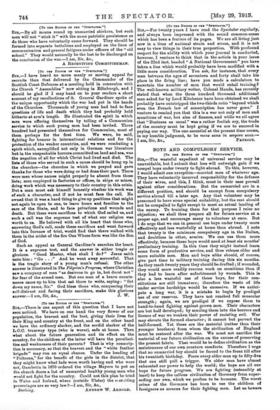[To rtre Fereoa or rem " SPi./.702."]
SIR,—I have heard no more manly or moving appeal for recruits than that delivered by the Commander of the Scottish Coast Defences at a meeting held in connexion with the Church " Assemblies " now sitting in Edinburgh, and I should be glad if I may hand on to your readers a short account of my recollections of it. General Gardiner spoke of the unique opportunity which the war had put in the hands of the Churches. Thousands of young men had had to face questions of life and death which they had probably held hitherto at arm's length. He illustrated the spirit in which men were offering themselves by telling of a Communion service to which such young men had been invited. Three hundred had presented themselves for Communion, most of them perhaps for the first time. We were, he said, fighting for honour in international relation' and for the protection of the weaker countries, and we were combating a spirit which, exemplified not only in German war literature but in the unspeakable horrors committed on land and sea, was the negation of all for which Christ had lived and died. The lists of those who served in such a cause should be hung up in the eh:arches—the churches in which we prayed and gave thanks for those who were doing or had done their part. There were men whose names might properly be absent from those lists; men employed in factories or offices, in ships or mines, doing work which was necessary to their country in this crisis. But a man must ask himself honestly whether his'work was of such a character, and if not he must face the call. He owned that it was a hard thing to give up positions that might not again be open to one, to leave home and families to the ears of the State, and to face privations and wound's and death. But these were sacrifices to which God called us, and such a call was the supreme test of what our religion was worth to us. He believed with all his heart that those who, answering God's call, made these sacrifices and went forward into this furnace of trial, would find that there walked with them lathe midst of the fire One Whose form was like the Son of God.
Such an appeal as General Gardiner's searches the heart. It is a supreme test, and the answer is either tragic or glorious. •• Good Master, what shall I do ?" Jesus Bait', unto him "Go . . ." And he went away sorrowful. That is the tragic story of a young man's refusal. The other answer is illustrated in The Pilgrim's Progress, where Christian saw a company of men "as desirous to go in, but durst not" for fear of the armed men. But one man of a brave counte- nance came up to him that eat there to write, saying : "Set down my name, Sir." God bless those who, conquering their self-distrust and facing their sacrifices, make this glorious


































 Previous page
Previous page